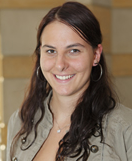How do you take your Development Advisory Team client with you along the journey from defining opportunity to delivering final outcomes?
Lauran Feist, student from 2016 class, shares her learning from her mentor Megan Olson, student of 2014 class, about how to cultivate effective client relationship and provide meaningful results.
Lauran Feist:
My hour-long phone conversation with Megan Olson proved exceedingly helpful. I was able to ask her a number of questions about her DAT and her experience creating the module with her team and teaching her classmates. In the 2014 class, Megan’s DAT client was BRAC in Bangladesh.
Megan's group was tasked with assessing different housing microfinance programs and presenting the information to the client, as BRAC was looking to start new types of loans. Her DAT assignment sounds very similar to the task my classmate, Maggie Guzman, and I are being presented with for Hagámoslo Bien. We are being asked to research different initiatives and organizations devoted to the rule of law and will be reporting back on important steps for our client moving forward. She gave me some great points as how to think tackle the DAT project most effectively:
1. It is important to have a meeting with our client and really pinpoint what they are seeking out of our research. In the case of Hagámoslo bien, the following questions need to be answered moving forward: Who’s your target user of your awareness? Are you researched base or policy based? Are you looking to Monterrey, greater Mexico, or Latin America? What does that advocacy look like – workshops, training local officials, elections regulations? Are you targeting the everyday citizen through television campaigns or posters?
2. Megan talked about how to effectively communicate with your client. She really stressed frequent check-ins and having the client give feedback during the research process. She also talked about different ways/preferences to communicate your final research to the client.
3. Megan talked about her experience doing field research in Cambodia with her team. I was very impressed by how she talked about the fieldwork experience and how much it enriched her team’s proposal for BRAC. Some quick things she mentioned were: Given that it is a week of research, it will be really hard to go to a place where Notre Dame or your team has few connections. In the case of our DAT project, where we are assessing other organizations to bring information back to our client, it is critical to choose a location with a higher concentration of relevant case studies, which was why Cambodia was a good fit for Megan’s DAT project.
Regarding her experience with creating the module with her classmates, her biggest piece of advice was to really look at your group as teammates – everyone has the same teaching goals and wants the module to be engaging and constructive. She said that her teammates almost became TAs during her class.
MEGAN OLSON
Development Advisory Team: BRAC; travelled to Cambodia
"During my time at Notre Dame, I studied Political Science and also graduated with minors in Brazilian and Portuguese Studies and International Development. Since graduation, I have spent the past 1.5 years working at Landesa, which partners with governments, communities, and other stakeholders in more than 50 countries to advance pro-poor, gender-sensitive land rights reforms using law and policy tools. At Landesa I work as a Program Coordinator, focusing on business development, project management, and communication. I frequently apply concepts discussed during our coursework including developing project theory of changes, designing and sequencing program activities into "logical models", and negotiation."


